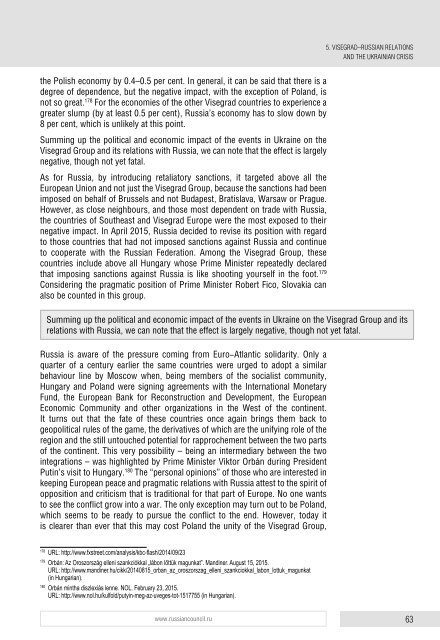RIAC-Visegrad-Report22-Eng
RIAC-Visegrad-Report22-Eng
RIAC-Visegrad-Report22-Eng
You also want an ePaper? Increase the reach of your titles
YUMPU automatically turns print PDFs into web optimized ePapers that Google loves.
5. VISEGRAD–RUSSIAN RELATIONSAND THE UKRAINIAN CRISISthe Polish economy by 0.4–0.5 per cent. In general, it can be said that there is adegree of dependence, but the negative impact, with the exception of Poland, isnot so great. 178 For the economies of the other <strong>Visegrad</strong> countries to experience agreater slump (by at least 0.5 per cent), Russia’s economy has to slow down by8 per cent, which is unlikely at this point.Summing up the political and economic impact of the events in Ukraine on the<strong>Visegrad</strong> Group and its relations with Russia, we can note that the effect is largelynegative, though not yet fatal.As for Russia, by introducing retaliatory sanctions, it targeted above all theEuropean Union and not just the <strong>Visegrad</strong> Group, because the sanctions had beenimposed on behalf of Brussels and not Budapest, Bratislava, Warsaw or Prague.However, as close neighbours, and those most dependent on trade with Russia,the countries of Southeast and <strong>Visegrad</strong> Europe were the most exposed to theirnegative impact. In April 2015, Russia decided to revise its position with regardto those countries that had not imposed sanctions against Russia and continueto cooperate with the Russian Federation. Among the <strong>Visegrad</strong> Group, thesecountries include above all Hungary whose Prime Minister repeatedly declaredthat imposing sanctions against Russia is like shooting yourself in the foot. 179Considering the pragmatic position of Prime Minister Robert Fico, Slovakia canalso be counted in this group.Summing up the political and economic impact of the events in Ukraine on the <strong>Visegrad</strong> Group and itsrelations with Russia, we can note that the effect is largely negative, though not yet fatal.Russia is aware of the pressure coming from Euro-Atlantic solidarity. Only aquarter of a century earlier the same countries were urged to adopt a similarbehaviour line by Moscow when, being members of the socialist community,Hungary and Poland were signing agreements with the International MonetaryFund, the European Bank for Reconstruction and Development, the EuropeanEconomic Community and other organizations in the West of the continent.It turns out that the fate of these countries once again brings them back togeopolitical rules of the game, the derivatives of which are the unifying role of theregion and the still untouched potential for rapprochement between the two partsof the continent. This very possibility – being an intermediary between the twointegrations – was highlighted by Prime Minister Viktor Orbán during PresidentPutin’s visit to Hungary. 180 The “personal opinions” of those who are interested inkeeping European peace and pragmatic relations with Russia attest to the spirit ofopposition and criticism that is traditional for that part of Europe. No one wantsto see the conflict grow into a war. The only exception may turn out to be Poland,which seems to be ready to pursue the conflict to the end. However, today itis clearer than ever that this may cost Poland the unity of the <strong>Visegrad</strong> Group,178URL: http://www.fxstreet.com/analysis/kbc-flash/2014/09/23179Orbán: Az Oroszország elleni szankciókkal „lábon lőttük magunkat”. Mandiner. August 15, 2015.URL: http://www.mandiner.hu/cikk/20140815_orban_az_oroszorszag_elleni_szankciokkal_labon_lottuk_magunkat(in Hungarian).180Orbán mintha diszlexiás lenne. NOL. February 23, 2015.URL: http://www.nol.hu/kulfold/putyin-meg-az-uveges-tot-1517755 (in Hungarian).www.russiancouncil.ru63


